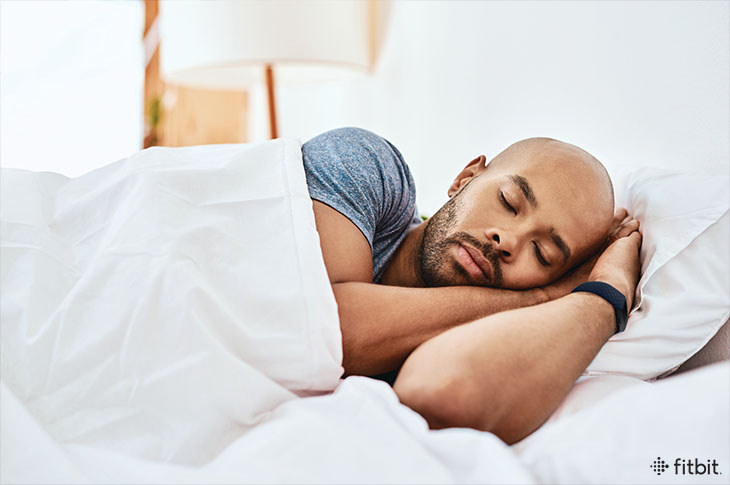
There’s no denying that we’re living through one of the most challenging periods in recent history. And for many people, it’s causing serious anxiety, and serious sleep issues right along with it.
So, the question is, if anxiety is keeping you up at night, what can you do to better manage your anxiety—and get better sleep in the process?
How are sleep and anxiety connected?
Before we jump into how to better manage your anxiety for better sleep, let’s quickly touch on how, exactly, anxiety can impact sleep.
Anxiety can negatively impact your ability to get a good night’s rest because “anxiety and sleep…result from two opposite responses of the autonomic nervous system,” says New York-based clinical psychologist Dr. Nikki Press.
“Anxiety is an emotional-physiological activation of the sympathetic nervous response, also called the ‘fight or flight’ response. When we feel anxious, our muscles tense up, our breath quickens, and our heart rate rises,” continues Press. “On the other hand, sleep results from our body’s parasympathetic nervous response, or the ‘rest and digest’ response. In sleep, our muscles relax, our breathing slows, and our heart rate decreases.”
Essentially, the nervous system’s response to anxiety is the exact opposite of how you want your nervous system to be functioning at bedtime—and if you’re experiencing anxiety, it can feel near impossible to drift off to sleep.
“When we understand that the sympathetic and parasympathetic responses are two opposing and incompatible body states, it becomes clear how heightened anxiety can interfere with sleep,” says Press. “When you are experiencing anxiety—with the worried thoughts, tense muscles, and increased heart rate that come along with it—your body will have a hard time achieving the relaxed state needed to fall asleep and stay asleep.”
So, if you want to get better, more restful sleep, managing your anxiety is an absolute must. But how, exactly, do you do that?
Let’s take a look at five strategies you can use to better manage your anxiety (both throughout the day and at bedtime), and improve your sleep as a result:
Make exercise a non-negotiable. Want to get your anxiety under control, and get better sleep in the process? Get moving. “Movement is a great way to reduce anxiety and also helps with sleep,” says Dr. Nishi Bhopal, MD, board certified psychologist and sleep specialist at IntraBalance and member of the review panel at Sleep Advisor.
According to research, exercise helps to manage anxiety in a variety of ways, including decreasing muscle tension and increasing the production of anxiety-fighting neurochemicals. Exercise has also been shown to help you fall asleep faster and get higher-quality sleep—meaning exercise can act as a one-two punch, helping to minimize anxiety and support better sleep.
What kind of exercise you do is up to you. Whether you’re lacing up your shoes and going on a run, hitting the trails for a hike, lifting weights, or hitting a yoga class, as long as it gets you moving and active, it can help to keep anxiety at bay—and get better sleep at night.
Power down your screens. Devices—whether they’re phones, tablets, laptops, or TVs—can cause anxiety and mess with your sleep in a major way. Not only is the 24/7 connectivity many have with their devices seriously stressful (as anyone who has spent their pre-bedtime hours “doomscrolling” can tell you), but the blue light those devices emit can throw your body’s natural sleep cycle (aka your circadian rhythm) completely out of whack.
“The blue wavelengths from tech devices activate your brain to remain alert and active—hours after you’ve discontinued your use,” says Aisha R. Shabazz, a licensed clinical social worker and therapist whose private practice, In Real Time Wellness, specializes in therapy for anxiety relief. “By reducing your brain’s exposure to the blue light, your mind will be able to slowly unwind and be more prepared for sleep when it’s time to rest,” says Shabazz.
When you’re using your devices during the day, “put a blue-light filter onto your screens or wear blue light glasses,” says Shabazz. And make sure to power down your devices at least a few hours before bed to give your brain time to unwind before it’s time for sleep.
Develop a sleep routine. Uncertainty and unpredictability can be major drivers of anxiety. So, if you want to better manage your anxiety, fostering regular, predictable routines can help, particularly when it comes to getting better quality sleep.
“Your brain loves routine and thrives when predictable habits are in place,” says Shabazz. “If you create a bedtime routine, you’re signaling to your brain and preparing your mind and body for sleep before you actually hit the sheets.”
Get in the habit of doing the same (relaxing!) things every night before bed. For example, you might unwind with a cup of tea, read a chapter of a book—or, if you want to maximize your routine’s sleep-boosting benefits, take a hot shower or bath, which can “increase melatonin naturally which will help initiate and maintain sleep,” says Lauri Leadley, clinical sleep educator and President of Arizona-based Valley Sleep Center.
Relaxing in a hot bath or shower can also help to manage the physical symptoms of anxiety, making it easier to fall asleep. “A hot shower [or bath] before bedtime can…help to relax your muscles and ease your breathing,” says Press.
Take anxiety out of the bedroom. If you’re having a particularly anxious day, that anxiety can keep you up at night. But if you find yourself tossing and turning with anxious thoughts, the last thing you want to do is stay in bed and try to force yourself to sleep.
“Get out of bed if you’re anxious; thinking and worrying while lying in bed ‘trying’ to sleep can actually worsen insomnia,” says Bhopal. “Over time, your brain will start to associate the bed with thinking and worrying,” making it harder to fall asleep.
So, if your anxiety is keeping you up at night, get up and take that anxiety right out of your bedroom. Go to another room and do a calming activity, like listening to soothing music, reading a book, or doing breathing exercises. Then, once you’re feeling less anxious, you can go back to bed and give sleep another go.
Transfer anxiety from your head to the page. If you’re dealing with middle-of-the-night anxiety—and your efforts to calm yourself down aren’t working—writing down your anxiety can be a helpful exercise.
“Racing thoughts…can wake you up in the middle of the night with a thumping heartbeat, and sweaty brow,” says Shabazz. “One way to help manage anxiety in that moment is to write down your [thoughts] that are floating about in your mind.”
Grab a journal and write down all the things you’re worried, stressed, or anxious about. The act of writing them down—and getting your thoughts out of your head and onto the page—can help alleviate your anxiety enough to get back to sleep.
“Anxiety wants us to consider everything with a sense of urgency, so the act of writing down your [thoughts] satisfies your mind’s need to do something now,” says Shabazz. “Writing down your thoughts on a slip of paper, in your notes app, or creating a voice memo is a great way to defer your worry for a later time, [making it easier to get back to sleep].”
This information is for educational purposes only and is not intended as a substitute for medical diagnosis or treatment. You should not use this information to diagnose or treat a health problem or condition. Always check with your doctor before changing your diet, altering your sleep habits, taking supplements, or starting a new fitness routine.

If you have questions about a Fitbit tracker, product availability, or the status of your order, contact our Support Team or search the Fitbit Community for answers.
Please note: Comments are moderated and may not appear immediately after submission.